Every September, the entire nation gets swept up in romantic memories of how unified things seemed on September 12th (the ultimate in having rose-tinted glasses), and commences its yearly #neverforgetting. 9/11 is, in so many ways, the ultimate past-facing commemoration. In my forthcoming book about my twenty years of work advocating for the kids who got sick from the World Trade Center clean-up, however, 9/11 is not a memory. It's tangible and political and the effects of it are ongoing. It's the illnesses my friends and I have suffered, the sometimes-hilarious, sometimes frustrating disconnects we've experienced in trying to parse the difference between experiencing 9/11 as an American and as a New Yorker. It's wondering where we fit into the narrative about the heroism of the first responders.
We're going to be subjected to a lot of #neverforgetting this September as we commemorate 9/11's 20th anniversary. Two decades on, however, I want to stop simply steeping in memories of the past. I want, instead, to focus on what we can learn from our response to those attacks. My book, Some Kids Left Behind: A Survivor's Fight for Health Care in the Wake of 9/11, endeavors to make the case that in the story of 9/11, there is much to learn about advocacy, about public health, about how to take care of our fellow citizens, and about what it means to be an active citizen.
Just after the death of Ruth Bader Ginsburg, I noticed a new expression making its way around the internet. Instead of offering the traditional, "may her memory be a blessing," RBG's mourners used a spin on that traditional Jewish saying first coined by sexual assault activists in Israel: "May her memory be a revolution." This turn of phrase is notable in that it's forward-looking. It's not about just memorializing, it's about how to use our memory to spur action. I hope that this year, in between telling unsuspecting strangers where we were on 9/11, we each take some space to think about the disaster victims we're creating right now and what we owe to them and each other.
With that said, it can take some extra inspiration to get into an active headspace on a national day of passive mourning. I've learned a lot from watching the actions and reading the words of the most famous names advocacy—the Stacey Abrams' and Gloria Steinems of the world—but I've gained significantly more from books that discuss advocacy as something regular people can do, with or without a pre-existing plan or fame or even money. Below is a list of my favorite books about taking action, both memoirs and how-tos. Many of these helped me navigate the disaster victim-to-advocate pipeline in the aftermath of 9/11. In the (slightly butchered) words of the feminist internet, may our collective memory of that day be a revolution.
*
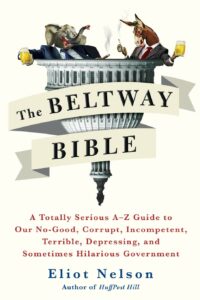
Eliot Nelson, The Beltway Bible: A Totally Serious A-Z Guide to Our No-Good, Corrupt, Incompetent, Terrible, Depressing, and Sometimes Hilarious Government
(St. Martin's Griffin)
Knowing your way around Washington and your local government is a key part of starting any kind of issue-based campaign, and this glossary of every inside-baseball term a budding activist needs to know is hilarious and useful without being condescending. A perfect reference for those moments where you've gotten inspired and now need to actually show up.
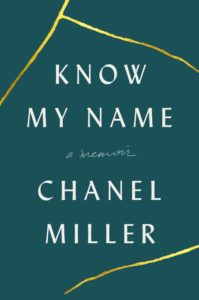
Chanel Miller, Know My Name
(Penguin)
I am most certainly not the first person to tell you about Miller's fantastic memoir, but it was a major inspiration to me as I embarked upon my book editing process and I wish I'd had it years ago as I first began to grapple with questions of how to turn my very different sort of "victimhood" into action and power. Also, when people ask me what the most important skill an advocate can have is, I always say, "be a good storyteller." Miller's ability to articulate not just how things happened but how they felt is second to none.
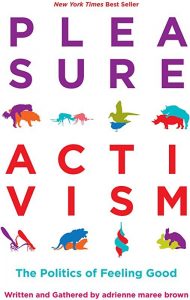
Adrienne Maree Brown, Pleasure Activism: The Politics of Feeling Good
(AK Press)
Despite what a lot of media would have you think, being an activist does not have to be a "job" job. People aren't doing it better just because they're overworked or bored or miserable. It should feel good. It should help you find community. The work should have its pleasures. This collection of essays serves as an important reminder that part of being a good activist is taking care of yourself.
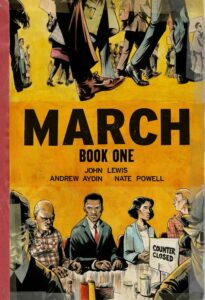
John Lewis, March
(Top Shelf)
If you're looking for advocacy inspiration, it never hurts to follow the example of the late Civil Rights Movement icon John Lewis. Both for graphic novel fans and fans of general good things, this comic book trilogy telling his story is educational, entertaining, and, above all, inspiring.
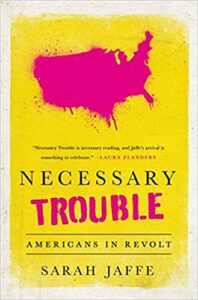
Sarah Jaffee, Necessary Trouble: Americans in Revolt
(Bold Type Books)
Jaffee's reporting is, in large part, about all of the forces that turn regular people into activists, covering the major grassroots movements of the last couple decades. Plus, maybe this will date me, but I love any analysis of the Occupy Movement that doesn't end with "but what did it accomplish?" and instead places it in the continuum of movements it took inspiration from and inspired. For myself, that movement was a major turning point. It was the first time I felt invited to decide for myself not just whether to contribute to a big movement but how I could contribute most effectively.
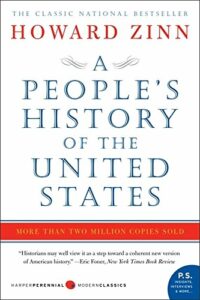
Howard Zinn, People's History of the United States
(Harper Perennial)
This is a classic and I'm not the first person who's told you about it but it's long so you probably haven't read it all. You should.
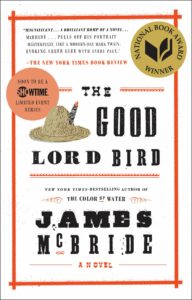
James McBride, Good Lord Bird
(Riverhead)
Stay with me here! This is one of my all-time favorite novels by one of my all-time favorite writers so maybe I'm just making up a reason to include it on this list, but one of the pieces of wisdom I'm thankful to have finally aged into is that every single person in history was incredibly flawed, good guys and bad guys alike. I think the first time this occurred to me was when I first read this novel, years ago, and experienced McBride's heightened take on a slew of major figures of the Civil War era. It got me thinking about how a lot of them were probably more ridiculous than we imagine now, which means all future historic figures are also possibly ridiculous people, which means you're probably dealing with ridiculous people whenever you're dealing with powerful people. Something about that feels like a good reminder because it's easy to get tricked into thinking you're the ridiculous once when you're fighting for what's right.
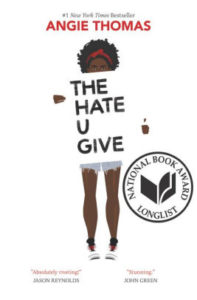
Angie Thomas, The Hate U Give
(HarperTeen)
This is not only a story that will make you want to take to the streets to fight police brutality, but it's another example of the "storytelling is an effective advocacy tool" strategy. Protagonist Starr humanizes and personalizes a policy discussion that's been happening everywhere, often in less effective form.
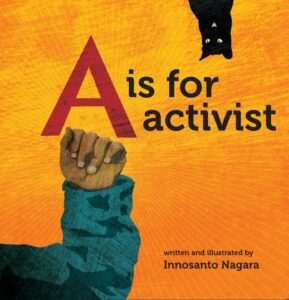
Innosanto Nagara, A is for Activist
(Triangle Square)
Buy this board book for every child you encounter. Otherwise they won't know nearly enough about the Zapatistas.
*
Further Reading:
Gloria Steinem, Education of a Woman
Caroline Criado Perez, Invisible Women: Data Bias in a World Designed for Men
Any Naomi Klein
Deborah Frances White, The Guilty Feminist
Philip Klinkner and Rogers Smith, The Unsteady March
Masha Gessen, The Man Without a Face
Leah Greenberg, We Are Indivisible
Lauren Duca, How To Make Change
Chimamanda Ngozi Adichie, We Should All Be Feminists
Jessamyn Conrad, What You Should Know About Politics . . . But Don't
Eitan Hersh, Politics Is for Power: How to Move Beyond Political Hobbyism, Take Action, and Make Real Change
__________________________________
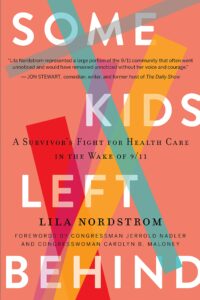
Some Kids Left Behind by Lila Nordstrom is available now.











No comments:
Post a Comment